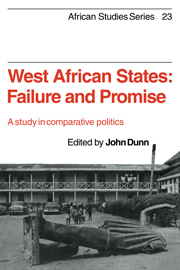4 - Ivory Coast
Published online by Cambridge University Press: 19 January 2010
Summary
What is the class character of the Ivorian state? What are the class interests of the Ivorian ruling class and why and in what manner has the postcolonial state intervened in order to reproduce a pattern of social relations compatible with the class character of this state? Since there does not exist an accepted ‘theory of the post-colonial capitalist state’, the analysis of the Ivorian class structure and of the class character of the state raises problems for which at present one can offer only solutions which are at best provisional. Consequently, the concepts which will be used are advanced with a view of putting forward working hypotheses and raising questions which point to the need for a great deal more empirical research before these concepts be used with any rigour.
Since the perspective adopted here and the questions which it raises differ so widely from those which official documents (and more particularly official statistics) are devised to answer, it is important to recognize the difficulties raised even by the question of documentation. The absence of documentation concerning the distribution of national income: the percentage distribution of national income to the highest and lowest quintile, the distribution of access to piped water and electricity, the distribution of land ownership particularly in the plantation sector – the absence of such figures is as central a feature of official Ivorian statistics as it is a problem central to the critical analysis of Ivorian society.
The use of a broad framework of analysis not only indicates the inadequacy of many existing empirical studies.
- Type
- Chapter
- Information
- West African States: Failure and PromiseA Study in Comparative Politics, pp. 66 - 116Publisher: Cambridge University PressPrint publication year: 1978
- 6
- Cited by

